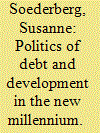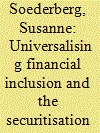|
|
|
Sort Order |
|
|
|
Items / Page
|
|
|
|
|
|
|
| Srl | Item |
| 1 |
ID:
113364


|
|
|
|
|
| Publication |
2012.
|
| Summary/Abstract |
Business now plays an increasingly prominent role in development. While the implicit links between private actors and international development institutions have been widely debated, the explicit role of financial corporations in shaping official development policy has been less well documented. We employ a feminist Marxian analysis to examine the material and discursive landscape of the 2012 World Development Report: Gender Equality and Development. Its exclusive focus on gender equality as 'smart economics', and the central role accorded to leading financial corporations like Goldman Sachs in the formulation of the key World Bank recommendations enable us to explore the changing landscape of the neoliberal corporatisation of development. We argue, first, that the apolitical and ahistorical representation of gender and gender equality in the wdr serves to normalise spaces of informality and insecurity, thereby expunging neoliberal-led capitalist relations of exploitation and domination, which characterise the social context in which many women in the global South live. Second, the wdr represents the interest of corporations in transforming the formerly excluded segments of the South (women) into consumers and entrepreneurs. The wdr thus represents an attempt by the World Bank and its 'partners' to deepen and consolidate the fundamental values and tenets of capitalist interests.
|
|
|
|
|
|
|
|
|
|
|
|
|
|
|
|
| 2 |
ID:
072531


|
|
|
|
|
| Publication |
London, Palgrave Macmillan, 2005.
|
| Description |
xiii, 297p.
|
| Standard Number |
1403948038
|
|
|
|
|
|
|
|
|
|
|
|
Copies: C:1/I:0,R:0,Q:0
Circulation
| Accession# | Call# | Current Location | Status | Policy | Location |
| 051396 | 327.1709051/SOE 051396 | Main | On Shelf | General | |
|
|
|
|
| 3 |
ID:
121775


|
|
|
|
|
| Publication |
2013.
|
| Summary/Abstract |
This article serves as an introduction to this special issue of twq on 'Debt and Development in the New Millennium'. It highlights the gaps in our knowledge about debt that the following contributions seek to fill and why this is important, both analytically and politically. In doing so, it discusses two core objectives of the special issue: first, to examine the role(s) that debt plays in mediating the underlying tensions of neoliberal-led development and its emphasis on market-led growth and poverty reduction schemes; and, second, to interrupt, contest and deconstruct the dominant economic representations and meanings of debt. Although the contributions draw on different theoretical frames to explore different features of debt across a variety of social spaces, a core hypothesis running through each article is that that there are additional complex and paradoxical dimensions to debt beyond what is represented by its common-sense economic meaning as an amount of money borrowed, voluntarily, by one party from another. This introductory article concludes by providing the reader with an overview of each contribution comprising the special issue.
|
|
|
|
|
|
|
|
|
|
|
|
|
|
|
|
| 4 |
ID:
097197


|
|
|
|
|
| Publication |
2010.
|
| Summary/Abstract |
One year after the 2008 crash, policy makers and international lending institutions declared the crisis over and assured the world that recovery was underway. The efforts of the Group of Twenty (G20) have been widely credited with securing economic recovery. In this article I examine the politics of representation of the crisis by the G20. I argue that the G20 summits have served to naturalise and depoliticise the crisis, thereby legitimating a narrow and very particular response to it. The politics of representation is bound up in what I term 'financial fetishism'. To demonstrate and explain how and why the G20 summits have engaged in a politics of representation alongside a politics of management, I proceed from an abstract to a concrete level of analysis by, first, revealing the social construction of neoliberal-led growth and the subordination of all social life to the rationality of the market, and, second, comparatively exploring the discourse of the G20 summits of 2009 and their predecessor: the New International Financial Architecture of 1999.
|
|
|
|
|
|
|
|
|
|
|
|
|
|
|
|
| 5 |
ID:
066432


|
|
|
| 6 |
ID:
079682


|
|
|
|
|
| Publication |
2007.
|
| Summary/Abstract |
One of the most striking trends in global development finance has been the growing role of Western-based, institutional investors. Pension funds in particular have played a leading part in supplying capital to publicly traded corporations in emerging market economies. An important feature of this type of financing has been the trend to make investment conditional not only on sound economic fundamentals, but also on a series of non-financial (or social) risk indicators (eg meeting labour standards and human rights). Despite the significance of non-financial benchmarking, these strategies have not been subjected to critical analysis, especially with regard to their wider impact on the reproduction of the mainstream development paradigm. This article addresses this gap by focusing on the benchmarking strategies of one of the world's largest pension funds: the California Public Employees' Retirement System (Calpers). Calpers's rating instrument, the Permissible Country Index (pci), employs both financial and non-financial risk indicators to screen its investments in 27 emerging markets. I argue that, despite its progressive sheen, the pci not only reproduces but also reinforces neoliberal forms of discipline and exploitation in the global South. It does this through coercive measures, such as divestment (ie removing a country from the pci), as well as through the construction of specific forms of knowledge that act to normalise the expansion and restructuring of spaces of capital in the global South
|
|
|
|
|
|
|
|
|
|
|
|
|
|
|
|
| 7 |
ID:
121778


|
|
|
|
|
| Publication |
2013.
|
| Summary/Abstract |
In the wake of the 2008 financial crisis the G20 leaders have attempted to universalise financial inclusion as a key development strategy Financial inclusion, which has long been championed by official development institutions as a sound and effective market-based solution to combat poverty, is also now promoted by the G20, not only as a way out of the ongoing global recessionary environment but also as an important scheme to stabilise the world economy. To this end the G20 Financial Inclusion Experts Group forged the G20 Principles for Innovative Financial Inclusion in 2010 (the G20 Principles). Drawing on a historical materialist lens, I argue that the G20 Principles- which represent extensions of, as opposed to a departure from, the neoliberal development project-serve to legitimate, normalise, and consolidate the claims of powerful, transnational capital interests that benefit from finance-led capitalism. The primary way this is achieved is through obscuring and concealing the exploitative relations and speculative tendencies involved in financial inclusion strategies.
|
|
|
|
|
|
|
|
|
|
|
|
|
|
|
|
|
|
|
|
|